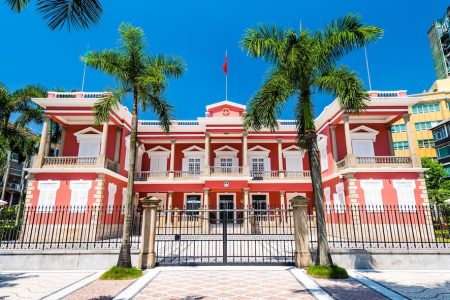Chief Executive Ho Iat Seng urged residents on Tuesday to think “rationally” about whether it would be suitable for the Zone D land reclamation project to go ahead by “looking at” the ongoing Zone C land reclamation project.
Ho also said that the local government’s newly proposed plan to reclaim land in the waters between the northeastern coast of the peninsula and the Zone A land reclamation area for the setting-up of a green area aimed to enable future residents living in Zone A to have a better living environment.
The chief executive also reaffirmed that his government’s latest proposal to replace the 58-hectare Zone D reclamation project with the 41-hectare reclamation project between the peninsula’s northeastern coast and Zone A will have to get a green light from the central government before it could get off the ground.
Ho made the remarks while speaking to reporters after attending Tuesday’s groundbreaking ceremony of a new library-cum-office building project of the public Macao Polytechnic Institute (IPM) on its campus in Zape.
Secretary for Transport and Public Works Raimundo do Rosário revealed last Tuesday that the local government planned to cancel its Zone D land reclamation project, and instead was planning to reclaim land between the northeastern coast of the peninsula and Zone A for a large green area so that the residents living in the peninsula’s densely populated northeastern neighbourhoods and the future residents living in Zone A could enjoy it in the future. The policy secretary said that the local government had requested the central government’s permission for the newly proposed reclamation project in exchange for axing the Zone D reclamation project.
Rosário also said at that time that the initial Zone D water area was not a good area to be reclaimed as it would destroy Macao’s “beautiful” coastal cityscape.
Zone D was initially slated to be reclaimed off the northern coast of Taipa between the Governor Nobre de Carvalho Bridge (commonly known as Old Bridge) and Friendship Bridge.
The Zone C land reclamation project off Ocean Gardens on the north-western coast of Taipa got off the ground in late 2018 and is slated to be completed early next year.
The still undeveloped 138-hectare Zone A will be primarily used for public housing.
Speaking to reporters on Tuesday, Ho said that his government was still studying its plan to reclaim land between the peninsula’s northern coast and Zone A instead of pushing ahead with the Zone D reclamation project and, consequently, the matter had not yet been decided. Therefore, he said, the government’s draft of Macao’s official urban master plan, which is under public consultation, still includes Zone D. “For the time being, the government has not [officially] removed Zone D,” Ho said, adding that the reclamation swap would have to be authorised by the central government first.
Ho pointed out that the local government plans 32,000 residential flats on the 1.38-square-kilometre Zone A where 96,000 residents were expected to live, adding that Zone A would be a densely populated residential area without any major green areas. That’s why, Ho said, his government now plans to reclaim land between the peninsula’s northern coast and Zone A for a green area so that Zone A residents could enjoy it.
Ho suggested that residents look at the ongoing Zone C reclamation project where the soil is already visible, and think “rationally” about whether the Zone C water area and the Zone D water area are good areas to be reclaimed.
Ho said that the local government could go ahead with the Zone D reclamation project “at any time” if residents consider that it would be suitable to reclaim land there. But Ho was quick to add that once the Zone D project goes ahead, the situation couldn’t be reversed.
Ho pointed out that the central government strictly assesses the local government’s proposals to reclaim land in Macao’s coastal waters so it isn’t easy for the local government to get permission from the central government for any new land reclamation projects. Ho said that’s why the local government has requested the central government’s permission for the transfer of land reclamation “resources” from the Zone D water area to the waters between the peninsula’s northeastern coast and Zone A. Ho urged residents to think about whether land reclamation resources should be allocated to areas that would result in a better urban development of the city.
Ho underlined that Macao will have a sufficient supply of housing in the next 20 years even without Zone D as many plots of land are available for the development of residential projects, such as in the Zone E1 land reclamation area and the plot at the bottom of Big Taipa Hill in Avenida Wai Long – i.e. the plot of the abandoned La Scala luxury housing project near the airport.
According to the website of the Infrastructure Development Office (GDI), the government has commissioned a consortium consisting of two construction companies to carry out the Zone D land reclamation project. The website merely says that the Zone D project is ongoing. Ho told lawmakers in April that Zone D could initially get off the ground but the government had decided to suspend it as it would need to study how Zone D should be developed in the future or whether the Zone D water area should be reclaimed.
(The Macau Post Daily/Macau News)
PHOTO © Government Information Bureau (GCS)






